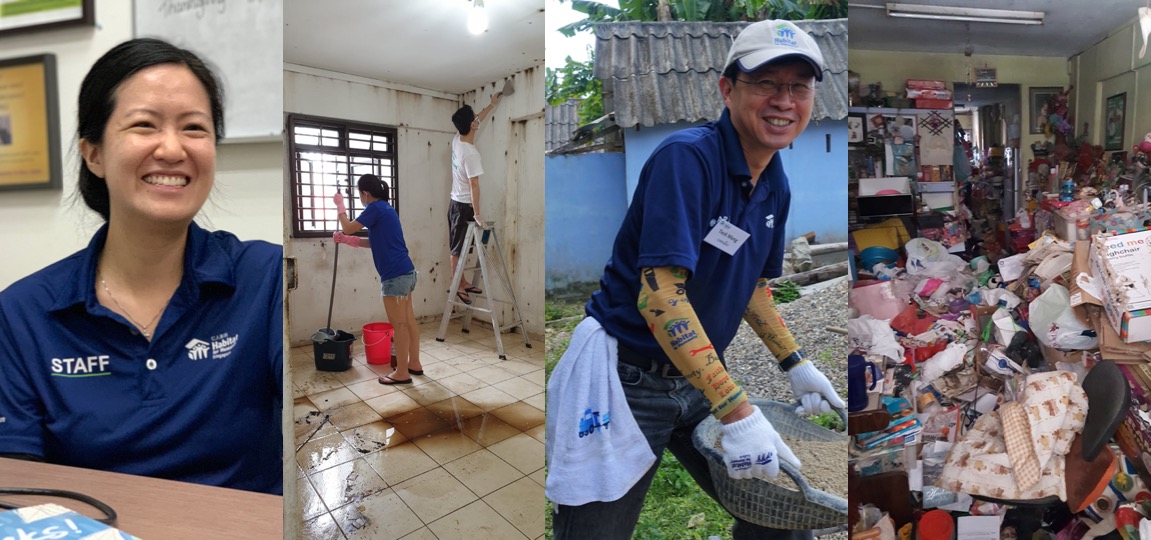Sim Chunhui has become such an expert with bed bug infestations that she can smell them from outside.
"There’s this weird smell of pesticide... and something," she says quite matter-of-factly.
The 35-year-old can now walk down a Housing Development Board (HDB) corridor and tell you which specific flats have bed bug infestations, just from the odour wafting from them.
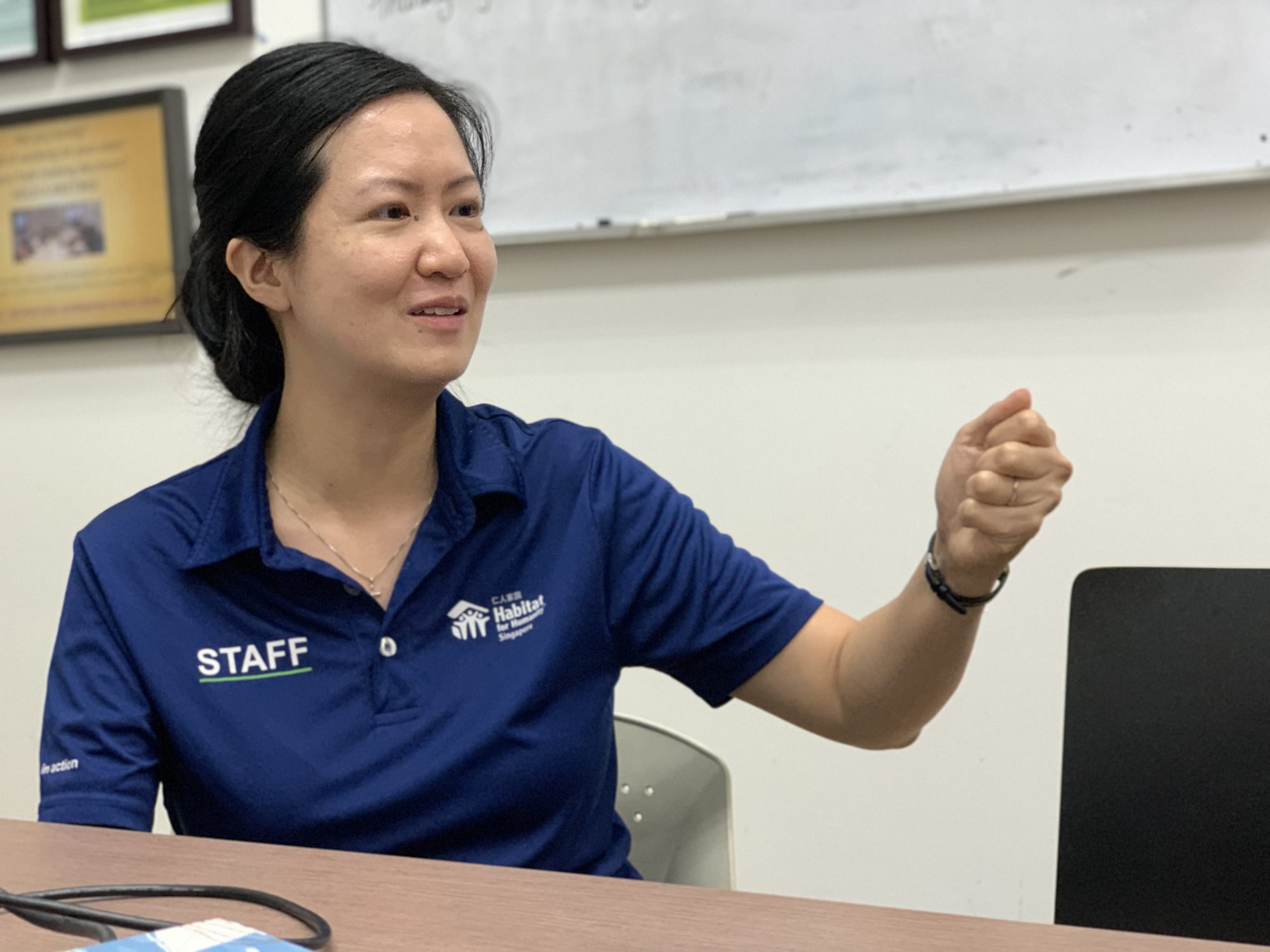 Photo by Jeanette Tan
Photo by Jeanette Tan
Sim, who is programme manager at Habitat for Humanity Singapore, has been on the job for a good seven and a half years now — including one year spent volunteering for the charity organisation.
She has lost count of the number of houses she has cleaned out in her time there till now — although in general, each staffer cleans between 70 and 100 homes per year, which means she will definitely have led teams of between six and seven volunteers and fellow staffers, cleaning up at least 600 flats.
“From time to time we see cases where the bedbugs are everywhere. For a recent case last week, even the hot water kettle had bedbugs too. So even their drinking water... I don't understand.”
More on that in a bit.
Now you might know Habitat for Humanity as an international charity that focuses on building housing in countries where it is needed — hence, why are they in Singapore, the only country in the world declared slum-free by the United Nations?
In the years they've been in Singapore, the organisation hasn't built a single house here.
After hearing stories of the passionate, "underpaid" people working full-time at Habitat Singapore (what Habitat for Humanity's local branch is truncated as), we would go as far as to argue that the very challenging effort they undertake to mobilise tens of thousands of volunteers to clean up thousands of flats here can be even more difficult and tedious than building new houses in our neighbouring countries.
Its unpaid full-time national director, S'porean pastor Yong Teck Meng
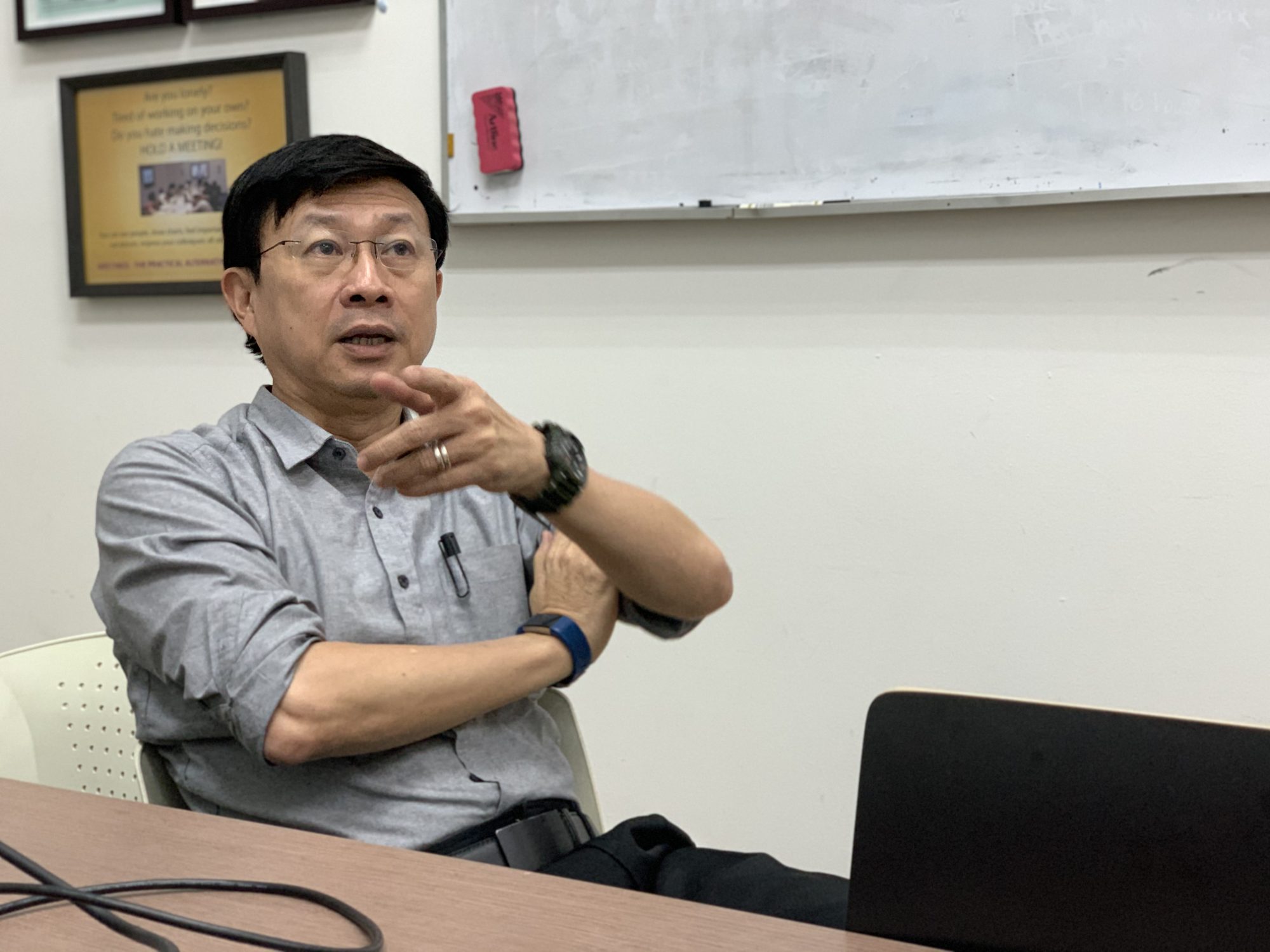 Photo by Jeanette Tan
Photo by Jeanette Tan
Yong, 57, is Habitat Singapore's first man on the ground, tasked in 2002 to start the international organisation's Singapore branch to help raise funds for overseas housebuilding projects.
Two years after opening the Singapore office with one full-time staffer, Yong sprung into action in late 2004, when the Indian Ocean earthquake-triggered tsunami hit many parts of the Indonesian coast, in particular Banda Aceh, the closest major city to the quake's epicentre.
The two of them ambitiously tabled a US$10 million proposal to the Singapore Red Cross, which had raised almost S$100 million from Singaporeans for disaster relief, to build houses in Aceh, and they got it — that year was also probably the first time Singaporeans came to know of Habitat for Humanity as well.
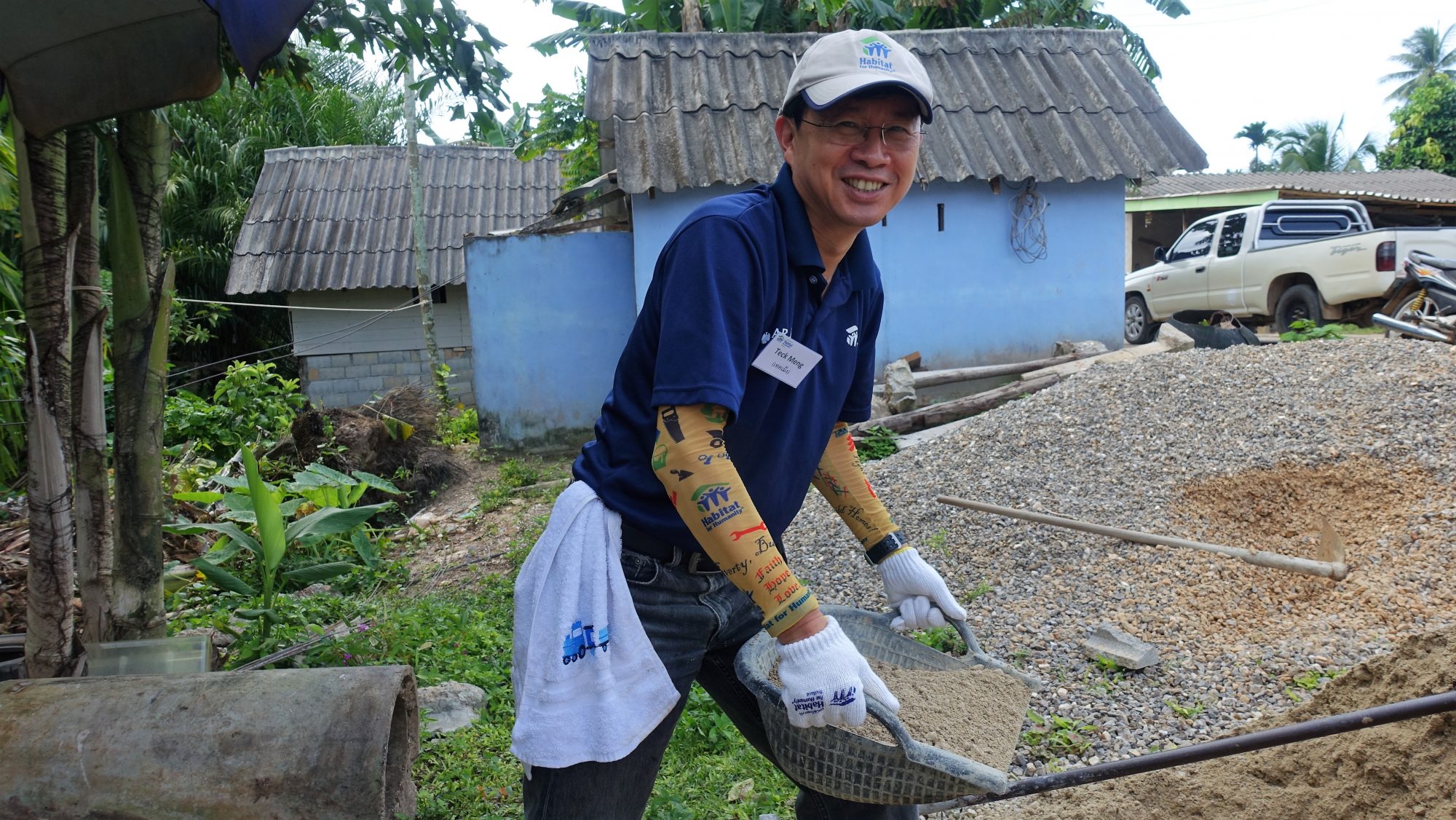 Yong happily building a house in Krabi, which he mostly prefers to the “wayang” (strategy meetings) he often has to do preceding the building on each trip he takes. (Photo courtesy of Habitat Singapore)
Yong happily building a house in Krabi, which he mostly prefers to the “wayang” (strategy meetings) he often has to do preceding the building on each trip he takes. (Photo courtesy of Habitat Singapore)
Even today, with the two-man team now having grown to a still-tiny 19, Habitat Singapore sends volunteers and also its own staff on multiple overseas house-building missions every year — Yong says he makes it a point to send staffers on company dime at least once a year to keep them "in touch" with what they are working for.
But fundraising for all these missions is complicated. Yong explains that here in Singapore, if funds are solicited from the public for a cause located overseas, a licence is required, and under that licence, an 80-20 rule applies: only 20 per cent of the funds raised can be sent overseas.
Which makes sense if you were to think about charity with a slightly more sceptical lens — being allowed to send money overseas without limits could set you up for a good bit of loophole exploiting and money laundering.
Adding to that, if a person circumvents this by donating money directly to a charity of their own volition for the purpose of being sent to an overseas cause, the donation will not be tax-exempt — which (the ability to qualify for tax deduction, that is), says Yong, unfortunately happens to be the reason many wealthy Singaporeans, including personal friends of his, donate large sums of money to charity.
And the understanding of this premise is kind of how Habitat Singapore’s local work started.
With the 80-20 rule not going anywhere anytime soon, coupled with what Yong describes as the prevailing Singaporean mentality of the clichéd "Charity begins at home", adding in verbal parentheses "and kind of stays at home also", he had to make sure Habitat Singapore was doing work for Singaporeans and in Singapore.
Hampered by bureaucracy, then discovering a calling
His first opportunity came with the last remaining kampung in Singapore, in Lorong Buangkok, where there was once a flood and Habitat Singapore received calls from members of the public urging them to help out.
He and his staffer went down to take a look at the situation, and concluded the problem stemmed from poor drainage. They had not even started to carry out their plan to help dig up a wider drain when Yong received calls from the Urban Redevelopment Authority and the area's member of parliament, asking why permission had not been sought from them earlier.
That experience was jarring for him, but it led him to the realisation that doing things on the ground the way Habitat for Humanity usually does isn’t as straightforward in hyper-organised Singapore, where there’s a government authority looking after pretty much everything.
So what’s a house-building charity to do? Yong’s experience with trying to help the kampung was one he saw light from, nonetheless — it led him to a home visit with a charity that a friend was running that helped him discover what would become the biggest running project they started back in 2006 and are doing today: Project HomeWorks.
The daunting task of cleaning an uninhabitable home
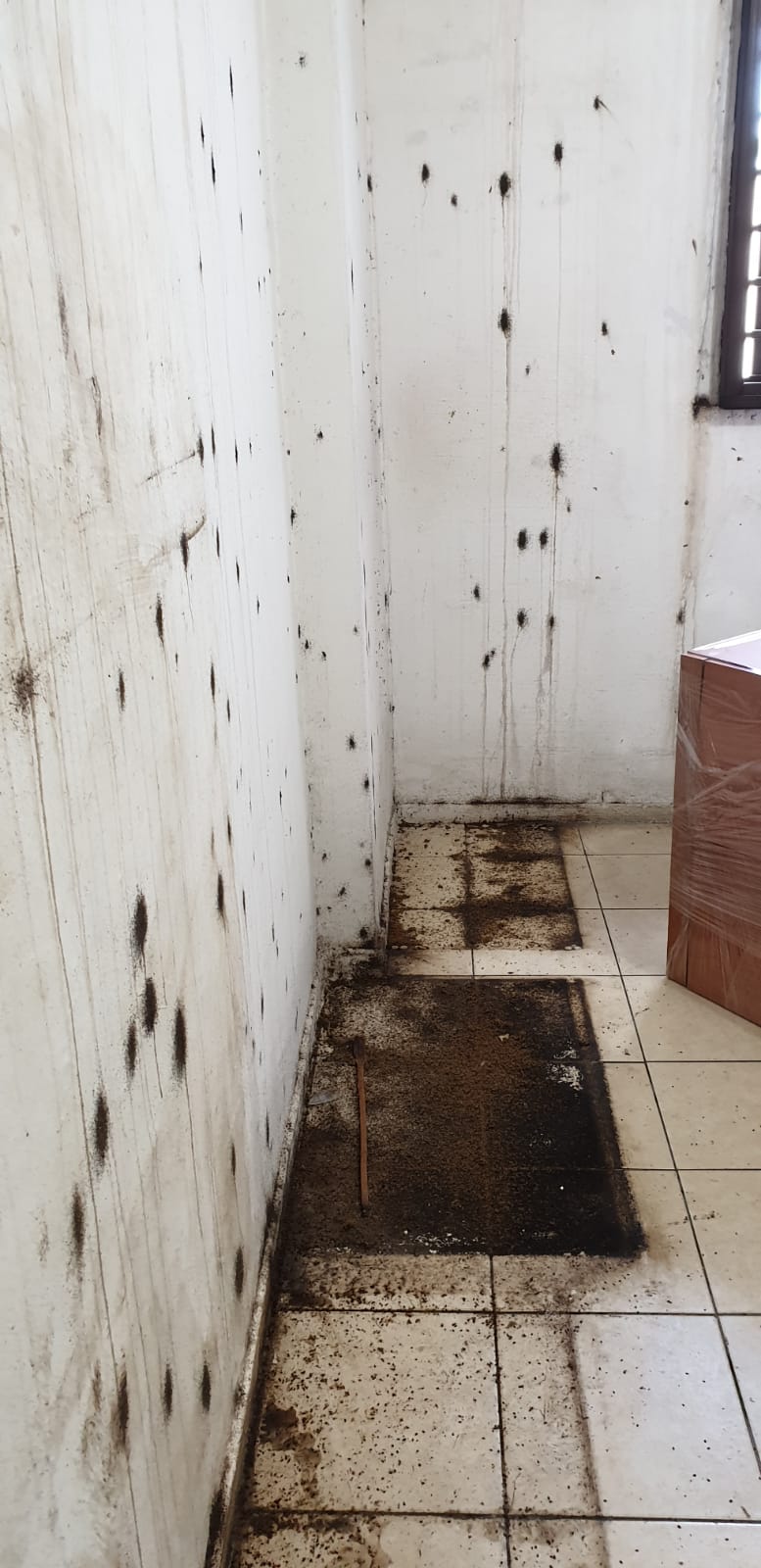 A home infested with bedbugs in Chinatown. (Photo courtesy of Habitat Singapore)
A home infested with bedbugs in Chinatown. (Photo courtesy of Habitat Singapore)
Those dark spots on the wall? Every single one is a bedbug nest, with the blackened areas being dried-up blood the bedbugs sucked from a human and pooped onto the wall, which then oxidises and turns black. Those specks on the ground? Yup, bedbugs too. Everywhere.
Here’s another angle of the same house, where the nests line two stretches of the same wall:
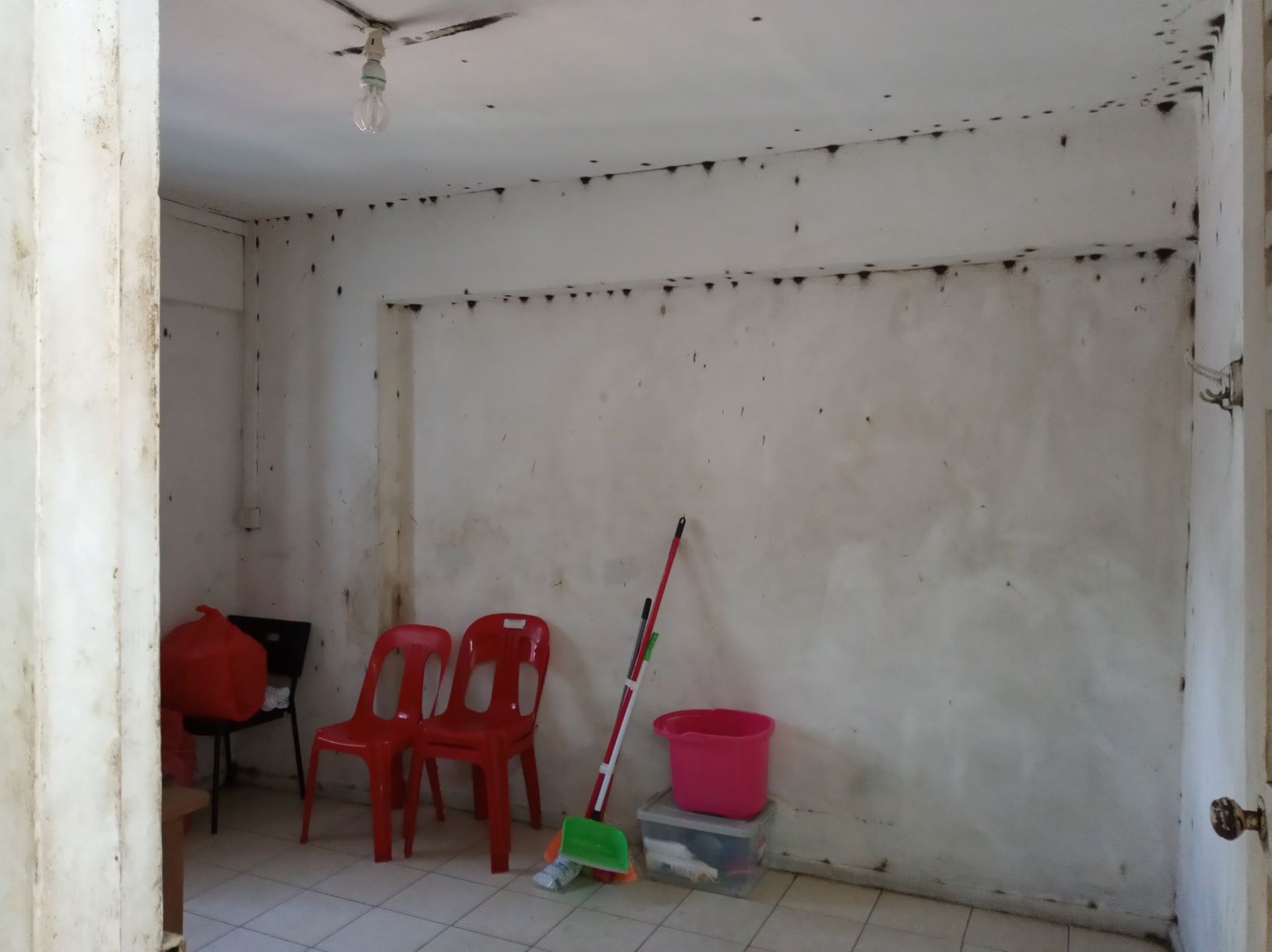 Photo courtesy of Habitat Singapore
Photo courtesy of Habitat Singapore
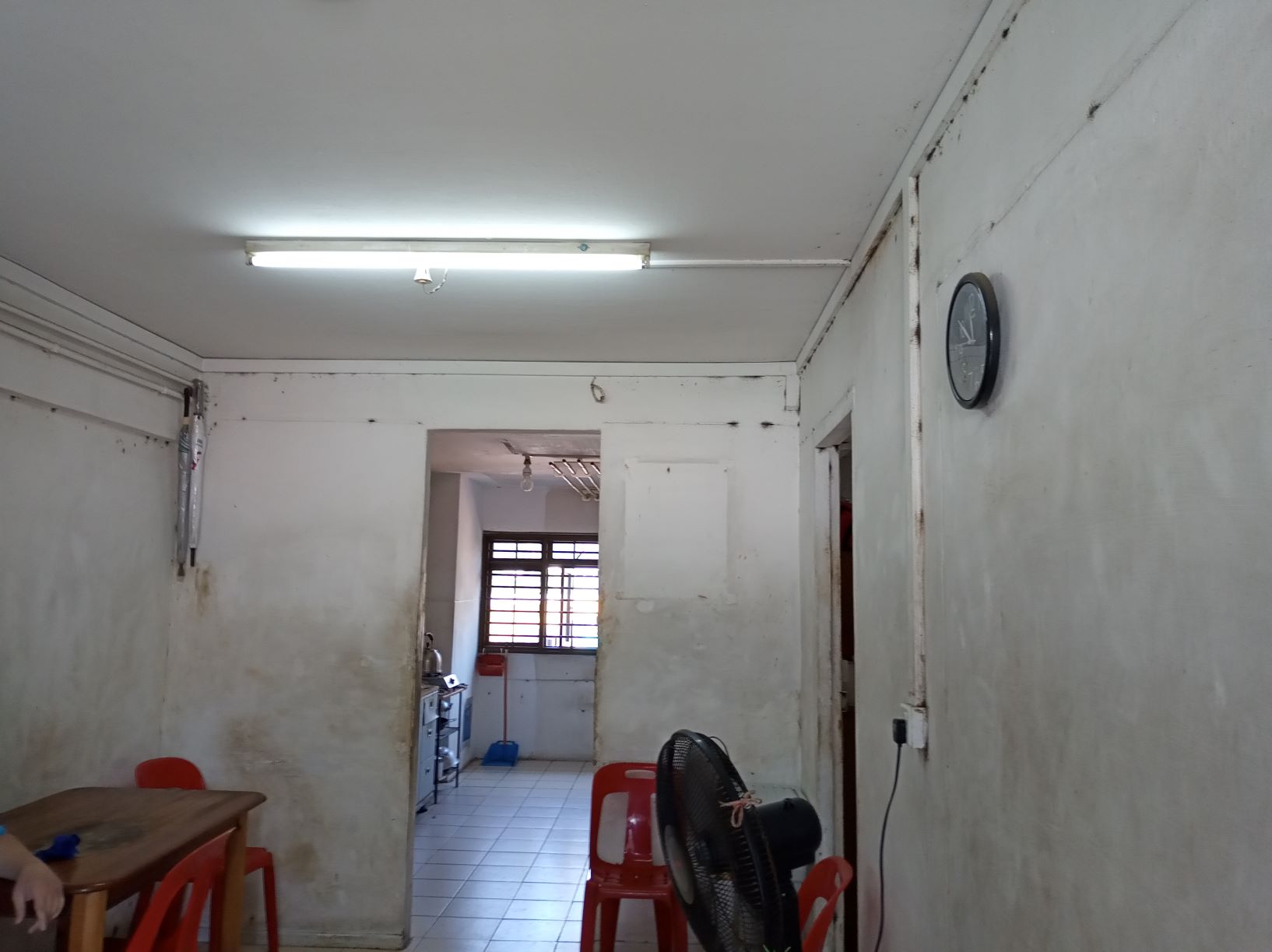 The extent of the infestation — it was all over the house, in all its crevices and in all its furniture. (Photo courtesy of Habitat Singapore)
The extent of the infestation — it was all over the house, in all its crevices and in all its furniture. (Photo courtesy of Habitat Singapore)
Sim takes over at this juncture and explains the mechanics of two main types of mess they tackle under Project Homeworks:
- Bedbug infestations, and
- Clutter — a key aspect of which is hoarding.
She explains that tackling bedbugs was a tedious and very expensive learning journey for Habitat Singapore — today, no more than one or two rounds of professional fumigation, intensive cleaning, steam plugging crevices and furniture replacement are needed for each home they assist with.
But when they were starting out, Sim recalls a lady’s case where her team made multiple trips and spent thousands of dollars on new furniture that they replaced, and had to replace multiple times over because bedbugs can repeatedly re-infest an apartment as long as they continue to exist in a unit.
"For her there was always one item she wouldn't throw. So every time I go back, the first time she agreed to change bed, change what, then can touch dining table? Cannot. Then throw wardrobe? Cannot…
So the only way to solve these types of cases is to keep trying and having the volunteers on our side, and donors who are understanding that some people have mental health issues — it's not that they're lazy or unwilling, they just cannot make sense sometimes.”
And despite Sim describing herself as being largely hardened to most horrors one witnesses and experiences in the process of doing this literally dirty, but very meaningful work, there were occasions where she was haunted by the words of the people whose homes she helped clean.
Once when she was still a volunteer, she recalls being in a corridor with an old man whose home was being cleared out by volunteers throwing out his items perhaps a little too enthusiastically.
“Then he turned to me and said, ‘Ah, actually I'm also useless; why don't you bag me up and throw me away with all these things that are useless?’”
She was also particularly struck by two little primary-school-aged boys she overheard during a cleanup session, when one said to the other, “Want to play the kill-the-bedbug game?”
And we haven’t talked about hoarding.
The heartache behind hoarding
Nobody seems to have statistics on how many hoarders there are in Singapore — as Yong puts it, “we keep discovering more people”.
A key principle Habitat Singapore has in the work they do is to get homeowners (and their families, where applicable) involved to solve the problems they are facing together with the volunteers.
And so, Sim says when they started tackling hoarding cases using this approach three years ago, she might not have anticipated what they were in for with their longest-running case yet.
This was the entrance of a lady’s home in Jurong, after Sim’s team spent three visits clearing chunks and layers of items from the outside corridor:
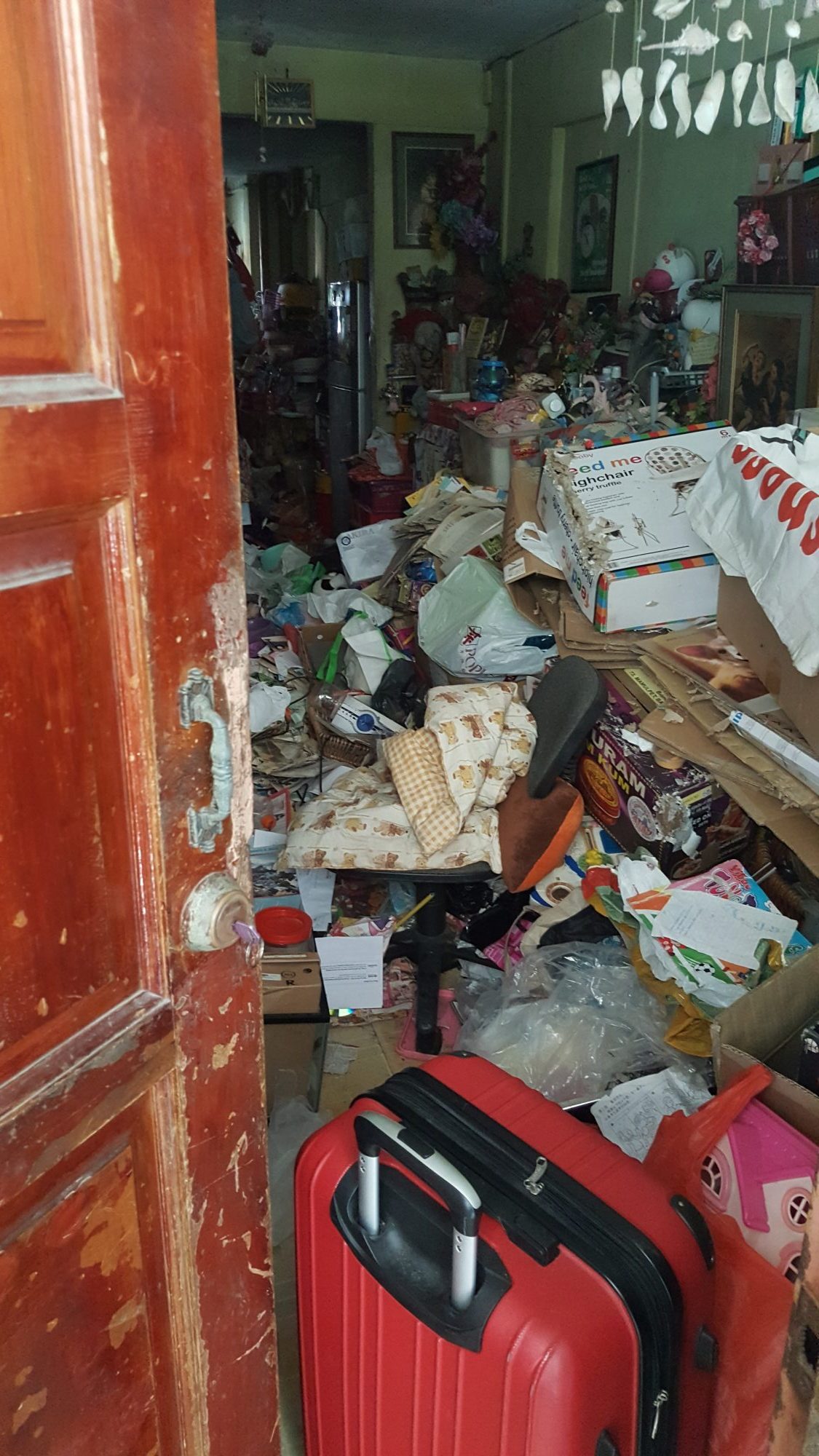 Photo courtesy of Habitat Singapore
Photo courtesy of Habitat Singapore
And these were the living area, bedroom and kitchen spaces the volunteers and staff were greeted by:
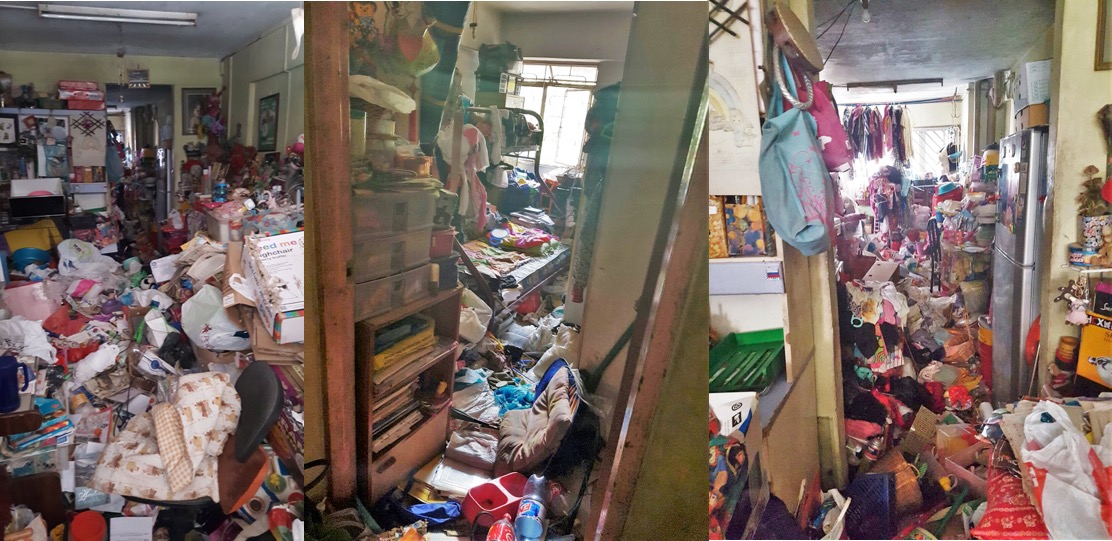 Photos courtesy of Habitat Singapore
Photos courtesy of Habitat Singapore
Over an entire year, and more than 30 two-hour visits the team made to her house in rotations of three to four people each time (she would either get crabby and tell them off, or become very emotional), the Habitat Singapore folks eventually carved out some living space for her:
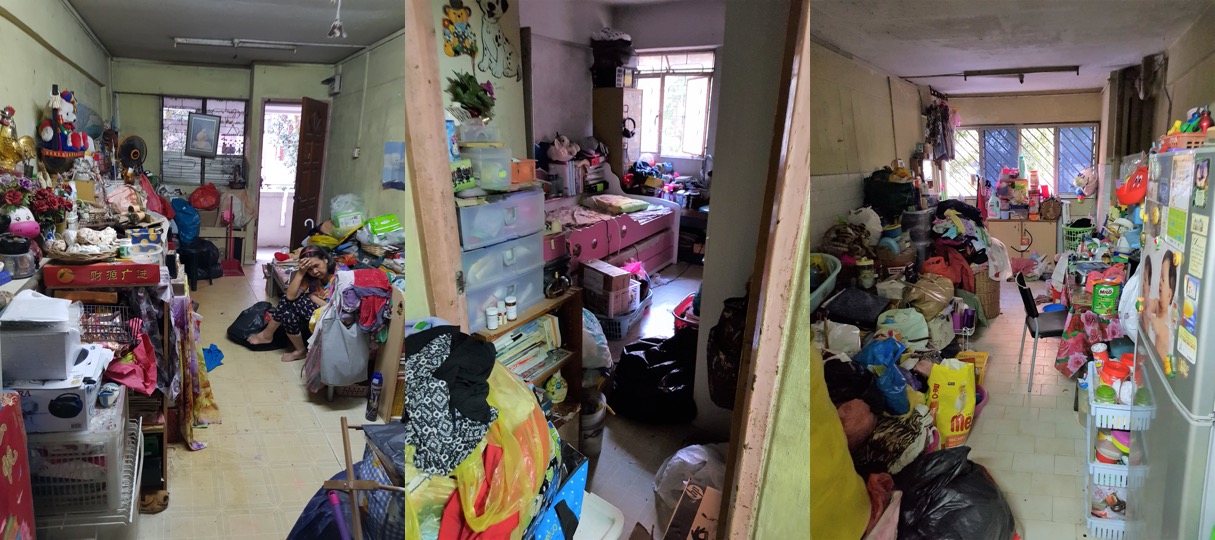 Photos courtesy of Habitat Singapore
Photos courtesy of Habitat Singapore
But the truth is, Sim says, that there is always a sad story behind every hoarder’s piles of clutter. Beneath the layers of cat poop-stained newspaper and cockroaches, in this particular woman’s case, were items belonging to her loved ones who passed away previously:
“But for aunty to see all these items resurfacing is very painful for her. She kind of buried it over, you know, so we can see that the ground zero of the hoarding actually started from that. It's kind of painful for her.”
Why volunteering with Habitat involves money AND time
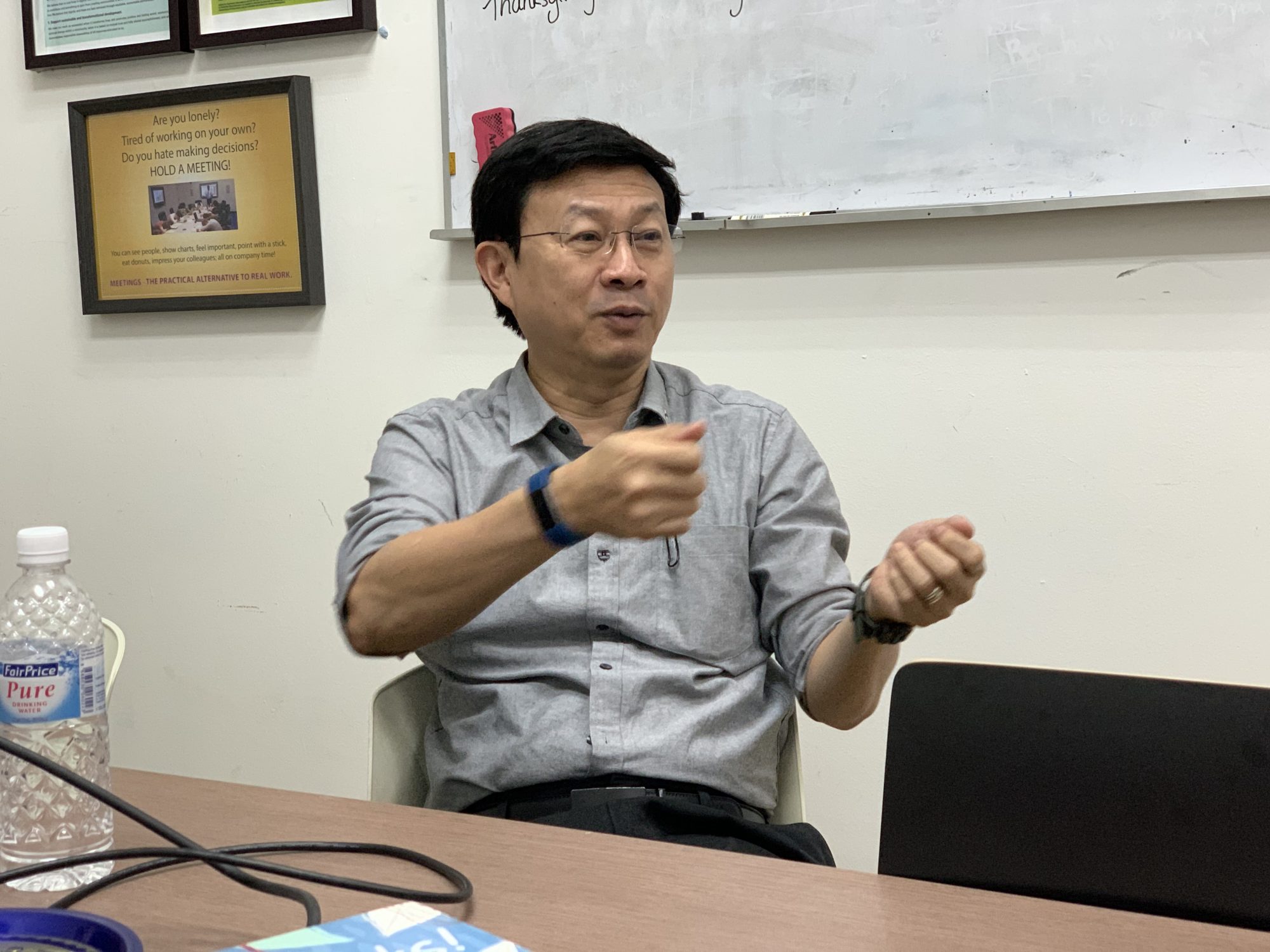 Photo by Jeanette Tan
Photo by Jeanette Tan
Moved to help? Great, but you'll also have to make a donation alongside your first round of cleaning — to help cover the cost of the stuff you’re using to clean the house, the furniture that may be needed to replace existing contaminated ones, professional pest busters, and also a management fee (for the staff who did all the liaison and set this cleanup up for you in the first place).
Yong completely understands that this situation is a jarring one to volunteers who first approach Habitat keen to help build houses in Nepal but balk at having to pay for their own flights to and fro — are they not, for instance, already giving up their energy, effort and time?
“The people who come to clean the houses, they think that ‘oh, I'm just here to clean the house, why should you ask me to donate more money than the material?’ It's because before you clean the house I have to send the staff to knock on Ah Kong's door and find out what he is doing and things like that. That takes a lot of time and those things need donations.”
In a big way, he also believes it has to do with a prevailing (mistaken) mentality many Singaporeans have that charity does not require money to happen.
“Then the other thing that people think is that ‘I'm going to give you one dollar. I want to make sure that one dollar completely go and help the poor. You cannot take a cent from it.’ Then excuse me how these people live ah, how the electricity ah, how you going to run all these things?
How do you do the auditing? How do you make sure that donors' money is not misused? Who is going to pay for trying to talk to ah gong and find out what is his need and that kind of thing? So this idea that 100 per cent of my donation must go to the poor is actually a huge problem because then nobody wants to pay my staff, then they all have to starve to death.”
What keeps them going? The joy of the people they partner with
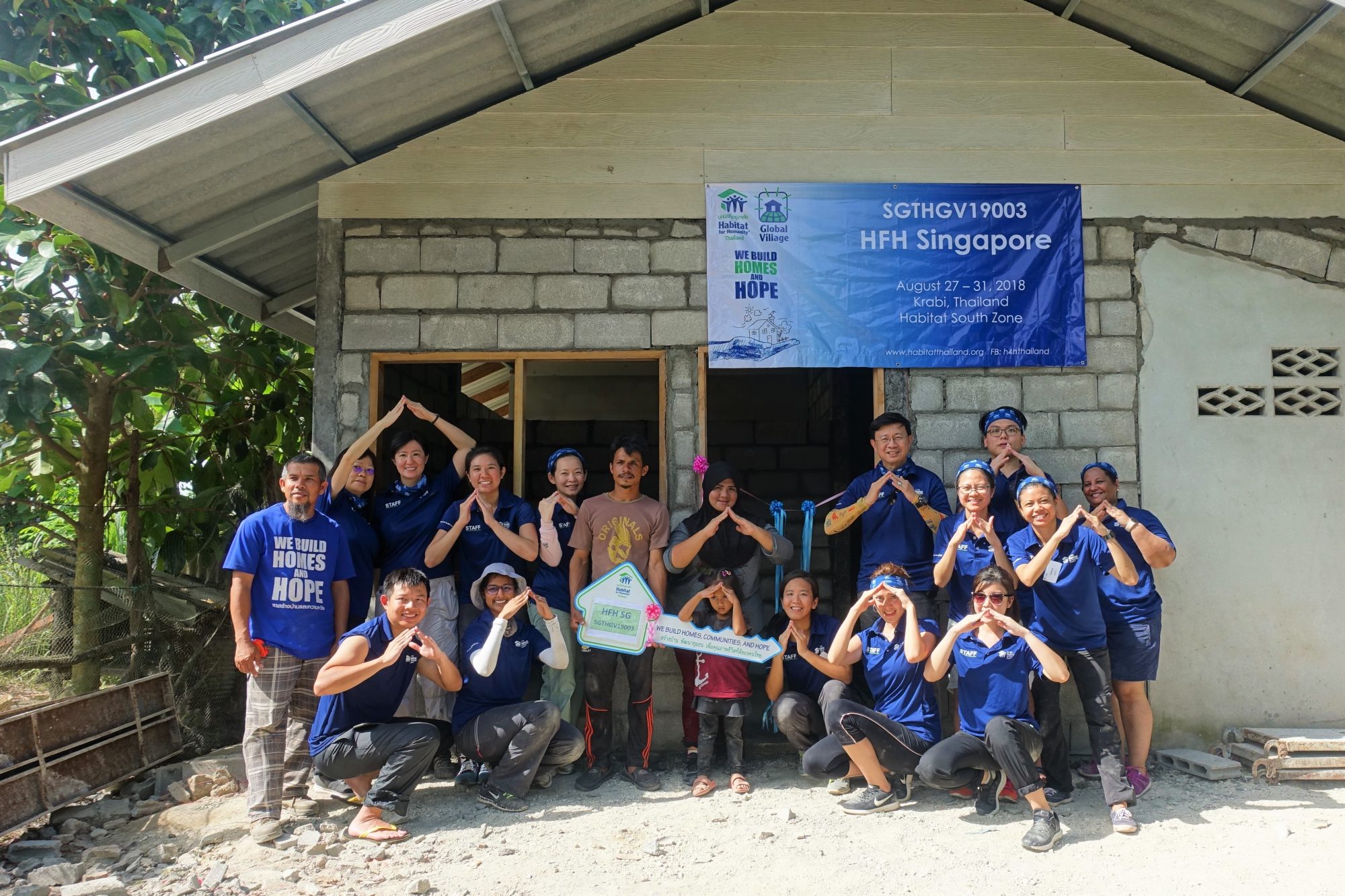 Photo courtesy of Habitat Singapore
Photo courtesy of Habitat Singapore
But what sustains Yong, who doesn’t draw a salary even though his is a full-time position? What keeps his 19 staff, whom he openly admits to not paying well, going?
His own words sum it up best, and most inspiringly:
“I always feel that the joy of the people we help is the fuel that keeps me going and should be the fuel that keeps my people going. So therefore everybody we recruit right, I always ask, is money important to you? Meaning not that you love money but you have a family to feed, a mother who is sick, you have 10 kids or whatever it is. If that is the case, you cannot work with us because you cannot be rich doing what we do, and you must get your cake somewhere else, so to speak.
You must get your cake from the idea that God has placed you here for a purpose. And our purpose is to show empathy.”
If tackling bedbug infestations or wading through hoarders’ homes doesn’t sound like something you can handle, you can still support Habitat for Humanity’s work by funding it.
As part of Giving Week, happening from Dec. 1 - 7, Habitat for Humanity Singapore is collaborating with online retail app Shopee as one of many charities you can give to and support in their efforts.
Habitat Singapore says it will dedicate any donations they receive over Giving Week to Project Homeworks and other local efforts they are working on.
Shopee is inviting its users to donate their Shopee coins to Habitat Singapore, and if you do this between Nov. 29 and Dec. 15, you could win a mystery gift from Shopee this Christmas too.
Click here to find out how you can play your part in giving to Habitat for Humanity this Giving Week.
Top photo collage: photos courtesy of Habitat Singapore, photo of Chunhui by Jeanette Tan
If you like what you read, follow us on Facebook, Instagram, Twitter and Telegram to get the latest updates.
